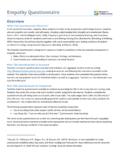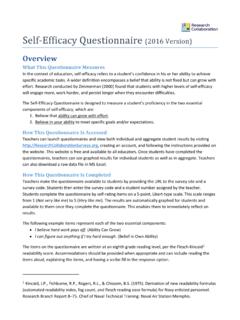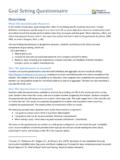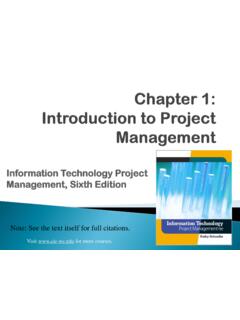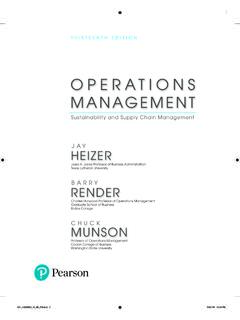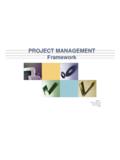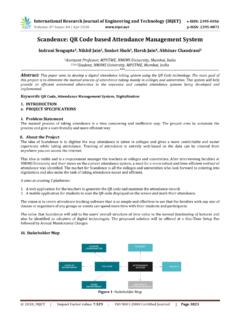Transcription of Conflict Management Formative Questionnaire Technical …
1 Conflict Management Formative Questionnaire Technical Report Overview What This Questionnaire Measures Conflict is a term used to describe a struggle or contest between people with opposing needs, ideas, beliefs, or goals. While manifestations of Conflict can range from minor disagreements to physical violence, Conflict is a natural part of human interaction. Along with competing for limited resources, Conflict can occur because of individual or group differences in rank, objectives, views, and traditions (Ayas, Deniz, Ka an, & Ken , 2010). Conflict Management skills can lessen those tensions or resolve problems that arise among individuals or groups who are at variance with one another. In the context of education, Conflict Management can be defined as knowing how you usually respond to Conflict , the reasons behind specific conflicts , and taking steps to resolve conflicts (Gaumer Erickson & Noonan, 2016).
2 The Conflict Management Formative Questionnaire is designed to measure a student s proficiency in the three essential components of Conflict Management , which are: 1. Understand your natural response to Conflict . 2. Understand the context of the Conflict , including the perspectives of all involved. 3. Apply a Conflict Management approach that is appropriate to the situation. How This Questionnaire Is Accessed Teachers can launch questionnaires and view both individual and aggregate student results by visiting , creating an account, and following the instructions provided on the website. This website is free and available to all educators. Once students have completed the questionnaires, teachers can see graphed results for individual students as well as in aggregate.
3 Teachers can also download a raw data file in MS excel . The Questionnaire can be cited as: Gaumer Erickson, & Noonan, (2018). Conflict Management Formative Questionnaire . In The skills that matter: Teaching interpersonal and intrapersonal competencies in any classroom (pp. 1 83-184 ). Thousand Oaks, CA: Corwin. This Technical report can be cited as: Gaumer Erickson, , Soukup, , Noonan, , & McGurn, L. (2018). Conflict Management Formative Questionnaire Technical report. Retrieved from How This Questionnaire Is Completed Teachers make the Questionnaire available to students by providing the URL to the survey ( ) and a survey code (specific code for each launched survey); both the URL and survey code are provided on the website when a survey is launched.
4 Students enter the survey code and a student number assigned by the teacher. Students complete the Questionnaire by self-rating items on a 5-point, Likert-type scale. This scale ranges from 1 (Not very like me) to 5 (Very like me). The results are automatically graphed for students and available to them once they complete the Questionnaire . This enables them to immediately reflect on results. The items on the Questionnaire are written at a seventh-grade reading level, per the Flesch-Kincaid1 readability score. Accommodations should be provided when appropriate and can include reading the items aloud, explaining the items, and having a scribe fill in the response option. How to Use the Results Conflict Management Formative Questionnaire results can be used by both teachers and students.
5 To ease interpretation, results are displayed on a 100-point scale. These scores can be interpreted similar to grades ( , 70-79 is a C). Results by essential component support reflection on relative strengths and areas for improvement. Students can use the Questionnaire results to determine their understanding of the context of a Conflict and their natural response to it. The results could help them develop different approaches to Conflict based on their understanding of the context and perspectives of all involved. Teachers can enhance their instructional practices by integrating Conflict Management training with subjects that inherently deal with Conflict . After combining targeted instruction with guided and independent practice, teachers can continually re-administer the Conflict Management Formative Questionnaire and alter their instruction accordingly.
6 This allows teachers to make evidence-based decisions to increase their students abilities to understand their natural response to Conflict , the context of the Conflict , and how to apply appropriate Conflict Management approaches. Numerous resources for teaching Conflict Management are available at Technical Information The Conflict Management Formative Questionnaire was developed in 2015 by Research Collaboration ( ). An extensive review of related research resulted in the identification of three components that are essential for successfully applying Conflict Management . Following this literature review, it was determined that Conflict Management requires individuals to understand their natural response to Conflict , to understand the context of the Conflict , and then apply Conflict Management approaches that are appropriate to the situation.
7 The Questionnaire was tested for reliability using Cronbach s coefficient alpha2 with 874 6th through 12th grade students during the 2016-2017 and 2017-2018 school years. Demographic data of grade and gender were added to the Questionnaire in fall 2017. Of the 874 students that completed the survey, 267 are not included in this 1 Kincaid, , Fishburne, , Rogers, , & Chissom, (1975). Derivation of new readability formulas (automated readability index, fog count, and Flesch reading ease formula) for Navy enlisted personnel. Research Branch Report 8 75. Chief of Naval Technical Training: Naval Air Station Memphis. 2 Cronbach, (1951). Coefficient alpha and the internal structure of tests.
8 Psychometrika, 16, 297 334.; Cronbach, (1988). Internal consistency of tests: Analyses old and new. Psychometrika, 53, 63 70. demographic data. Of the 603 students that responded to demographic items, 291 (48%) were female, 256 (42%) were male, and 56 (9%) did not report gender. The dataset includes 260 students in sixth-grade, 81 in seventh-grade, 3 in eighth-grade, 81 in ninth-grade, 85 in tenth-grade, 34 in eleventh-grade, and 59 in twelfth-grade. Overall, the Conflict Management Formative Questionnaire was found to be moderately reliable (21 items; = .871). The understand natural response subscale consisted of 9 items ( = .787), the understand context subscale consisted of 6 items ( =.)
9 703), and the apply approach subscale consisted of 6 items ( = .604). When converted to a 100-point scale, the bottom quartile ranged from 29 to 63 and the top quartile ranged from 79 to 100. The questions that make up each component are listed below. Questions that are framed negatively and therefore reverse scored are designated with (N) . Understand Natural Response 1. I can think of several different ways to deal with a disagreement. 2. I have thought about how I normally respond to conflicts . 3. I feel good about how I handle most conflicts or disagreements. 4. The ways I try to resolve conflicts usually work for me. 5. I respond to different disagreements differently. 6. In an argument, I try to understand the other person s point of view.
10 7. When someone is upset with me, I try to find out why. 8. If two friends are arguing, I try to understand both sides of the argument. 9. I try to figure out if someone is arguing just because they re in a bad mood. Understand Context 10. Instead of jumping to conclusions, I try to figure out why there s a disagreement. 11. I try to understand if a disagreement is caused by a misunderstanding. 12. When I m mad at a friend, I avoid talking to him or her. (N) 13. I try to find win-win solutions to disagreements. 14. When I disagree with someone, I talk about how I feel and listen to them talk about how they feel. 15. When I m involved in a disagreement, I stop and think about what I should say or do.
